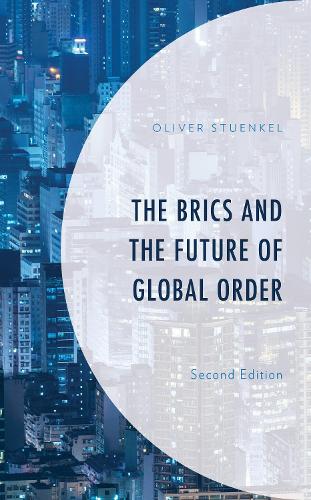
The BRICS and the Future of Global Order
(Hardback, Second Edition)
Available Formats
Paperback, Second Edition
Published: 18th June 2021
Hardback, Second Edition
Published: 3rd February 2020
Publishing Details
The BRICS and the Future of Global Order
By (Author) Oliver Stuenkel
Bloomsbury Publishing PLC
Lexington Books
3rd February 2020
Second Edition
United States
Classifications
Professional and Scholarly
Non Fiction
International economics
337.091724
Physical Properties
Hardback
272
Width 159mm, Height 233mm, Spine 26mm
585g
Description
The transformation of the BRIC acronym from an investment term into a household name of international politics andinto a semi-institutionalized political outfit (called BRICS, with a capital S), is one of the defining developments in international politics in the past decades. While the concept is now commonly used in the general public debate and international media, there has not yet been a comprehensive and scholarly analysis of the history of the BRICS term. The BRICS and the Future of Global Order, Second Edition offers a definitive reference history of the BRICS as a term and as an institutiona chronological narrative and analytical account of the BRICS concept from its inception in 2001 to the political grouping it is today. In addition, it analyzes what the rise of powers like Brazil, Russia, India, China, and South Africa means for the future of global order. Will the BRICS countries seek to establish a parallel system with its own distinctive set of rules, institutions, and currencies of power, rejecting key tenets of liberal internationalism, are will they seek to embrace the rules and norms that define todays Western-led order
Reviews
In this second edition, Stuenkel (Getlio Vargas Foundation, Brazil) presents an in-depth analysis of BRICS, an association of five emerging powers (Brazil, Russia, India, China, and South Africa), illustrating how these countries have countered Western influence in international institutions such as the UN, the World Bank, and IMF. Stuenkel's well-balanced analysis discusses both the positive and negative aspects of intra-BRICS cooperation, particularly its views on the UN's "Responsibility to Protect" (R2P) in Libya. . . Stuenkel presents readers with the complexities of this BRICS grouping, acknowledging tensions that exist among members, and in the case of Russia's invasion of Crimea, how the actions of one member can impact the foreign policy of others. Whether BRICS will trigger a systemic change in the global order or not, Stuenkel's analysis makes clear that the legitimacy of the current international order is undermined, and emerging powers can no longer be silenced or denied access to reshape international institutions. This well-written volume remains the sole publication providing a comprehensive historical analysis of BRICS. Summing Up: Recommended. Lower-division undergraduates through faculty; professionals.
-- "Choice Reviews"Author Bio
Oliver Stuenkel is associate professorat the School of International Relations at the Getlio Vargas Foundation.
